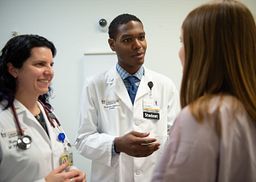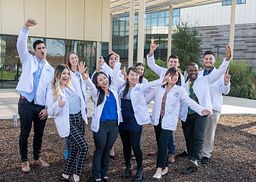Fast Facts About the Dominican University of California PA Program

Fast Facts About the Dominican University of California MSPAS Program
Information Courtesy of Carl Garrubba, DMSc, PA-C, Dean, School of Health and Natural Sciences, Dominican University of California
Program Name & Location: Dominican University of California MSPAS Program in San Rafael, California
Program mission, vision & values:
- Mission: At Dominican, we prepare PAs to provide compassionate, high quality, patient-centered care as members of interdisciplinary healthcare teams. To achieve this, the program provides an exemplary, active learning environment that integrates theoretical learning and inquiry skills with clinical practice, promoting diversity and inclusion among the student body, faculty and staff. Our approach to teaching nurtures reflection, creativity, and critical thinking as core competencies of the profession. Graduates will be culturally competent, committed to lifelong learning and their professional development. They will be prepared to make significant contributions to the diverse communities that they serve and to the advancement of the PA profession.
- Vision: Our vision is to be a national leader in PA education and to prepare physician assistants of the highest quality to practice medicine, in partnership with physicians and other members of the healthcare team, in dynamic healthcare environments.
- Educational Philosophy: Our students will gain the knowledge, skills, and attitudes necessary to respond positively and effectively to challenges and opportunities relating to trends in healthcare delivery. Students will learn in groups, through discussions and lectures and role-playing, and through the use of standardized and simulated patients, independent research, and case-based problem-solving. Our focus on higher order of learning prepares PAs for critical thinking, ethical decision making, and the synthesis and judgment of problems, based on an integrated biopsychosocial medical model. PA students will learn to be reflective, insightful, and aware of professional roles as well as the limitations, needs, styles, and values of patients and other health professionals.
What year did your program welcome its first class of students? 2017
What are the key milestones in your program’s history?
- 2017 – ARC-PA Provisional accreditation granted
- 12/2019 – Graduated our first class of 23 students. 96% PANCE pass rate
- 12/2020 – 100% PANCE pass rate
- 3/2022 – ARC-PA Continuing accreditation granted for 10 years
- 4/2022 – Overall PANCE pass rate for the first three classes is 96%
How many students have graduated from your program to date? 77
How has your program grown from the first class to today?
We admitted 24 students in the first class, 30 students in the second class, 30 students in third class, 33 students in the fourth class, and 35 students in the fifth and sixth classes.
How has your program contributed to creating a more diverse, just, and equitable profession? We have graduated a very diverse class every year and many of our graduates are serving in medically underserved areas.
How have your faculty or students advocated for the PA profession?
Students have been involved in AAPA leadership positions each year. Faculty and students are actively involved in the California Academy of PAs, our state-level PA organization.
How do you envision the next 50 years of your program?
I would like to see the program grow to its maximum of 40 students with excellent clinical rotations and strong community and hospital relationships. I would also like to continue to see diversity among the student body and actively work at recruiting more students from backgrounds underrepresented in medicine for the program. Along that same vein, I would like to see more racial and ethnic diversity among the faculty and staff. We look forward to seeing our students graduate to be leaders in our profession!



